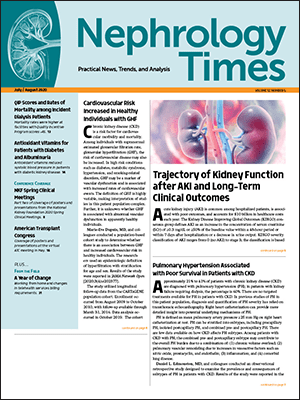
Managing patients with hyperkalemia while improving patient outcomes requires clinicians to implement evolving standards of care and to apply relevant emerging data. Amy Larkin, PharmD, and colleagues conducted a study to determine whether a series of online continuing medical education (CME) activities could improve nephrologists’ clinical knowledge, competence, and confidence in managing patients with hyperkalemia.
Results of the study were reported during the NKF 2020 Spring Clinical meetings in a presentation titled Online CME Effectively Improves Nephrologists’ Knowledge, Competence, and Confidence Related to Hyperkalemia.
The online CME curriculum included two online, 30-minute activities with discussions with experts on hyperkalemia. The discussions focused on new data and case-based application of the data in common patient cases. A repeated pairs pre-/post-assessment study design was used to assess the educational effects of the activities; individual participants served as their own control. McNemar’s chi-squared test assessed whether the mean post-assessment score differed from the mean pre-assessment score for all questions combined.
P values <.05 were statistically significant. The effect size was determined using Cramer’s V: 0.06 to 0.15 was a noticeable effect; 0.16 to 0.26 was a considerable effect, and >0.26 was an extensive effect. The online activities launched in March and June 2019 and data were collected for four weeks for each activity.
The analyses results demonstrated improved knowledge and competence among the participating nephrologists (n=371). There was a 10% increase in recognizing the impact of potassium levels in patients with heart failure (n=188; V=.088; P=.08), a 17% increase in selecting a treatment strategy when a patient becomes euvolemic but still shows slightly elevated potassium levels (n=188; V=.191; P<.001), and a 24% increase in recognition of long-term data for newer potassium binders (n=183; V=.193; P<.001).
In addition, 26% (n=183) had a measurable increase in confidence in using a potassium binder to treat a patient with hyperkalemia and 34% (n=188) had a measurable increase in confidence in applying team-based strategies for improved management of patients with heart failure who present with hyperkalemia.
The analysis identified persistent gaps in knowledge and competence: 56% of nephrologists (n=183) incorrectly identified the incidence of hyperkalemia in patients with heart failure who were treated with renin-angiotensin-aldosterone system inhibitors; 49% (n=183) could not recognize long-term efficacy data for newer potassium binders; and 74% (n=188) made an incorrect clinical decision in a patient who was euvolemic but had elevated potassium levels.
In conclusion, the researchers said, “This study demonstrates the success of an online curriculum with multiple educational components at improving knowledge, competence, and confidence of nephrologists related to hyperkalemia management. Persistent gaps were identified for future educational targets.”
Source: Larkin A, Anderson D, Boutsalis G. Online CME effectively improves nephrologists’ knowledge, competence, and confidence related to hyperkalemia management. Abstract of a presentation at the National Kidney Foundation 2020 Spring Clinical Meetings (Abstract #326).







 © 2025 Mashup Media, LLC, a Formedics Property. All Rights Reserved.
© 2025 Mashup Media, LLC, a Formedics Property. All Rights Reserved.